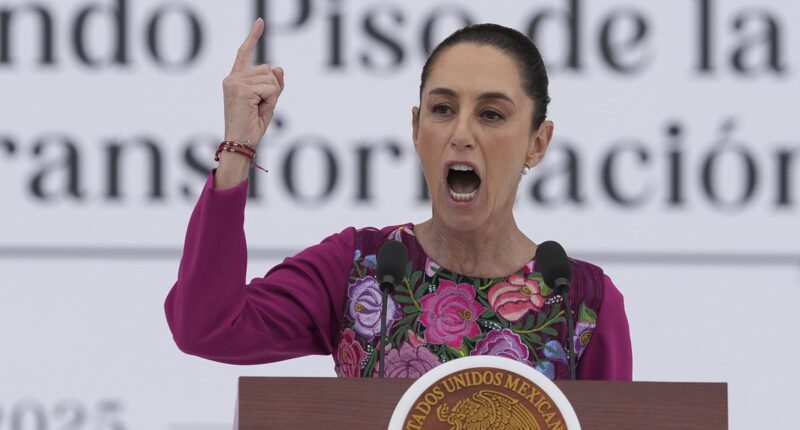Mexican President Claudia Sheinbaum responded to Donald Trump’s decision to impose 25 percent tariffs on all Mexican goods by ordering retaliatory tariffs. This move has raised concerns about the possibility of prices increasing.
In retaliation, Mexico is considering imposing tariffs on US imports, with rates varying from 5 percent to 20 percent. The targeted products include pork, cheese, fresh produce, manufactured steel, and aluminum, as reported by Reuters.
The auto industry will be initially exempt, but there hasn’t been a timetable on when that could change.
Sheinbaum said her government sought to negotiate with the US, its top trading partner, but it appears those efforts fell through.
Sheinbaum stated, “‘I’ve instructed my economy minister to implement the plan B we’ve been working on, which includes tariff and non-tariff measures in defense of Mexico’s interests.” This decision signifies Mexico’s determination to protect its interests in the face of escalating trade tensions.
President Trump had been threatening tariffs on Mexico, Canada and China – which together make up about 40 percent of US imports – ever since he got elected in November. This weekend, he set the stage for a large-scale trade war with all three countries.
Like Mexico, imports from Canada will also see a 25 percent levy. Chinese goods entering the country will be taxed at an additional 10 percent.
The tariffs will mean an annual loss in purchasing power of around $1,200 for typical American families, according to the Budget Lab at Yale University.

President Claudia Sheinbaum speaks to the crowd during an event marking her first 100 days in office in Mexico City, Sunday, January 12
For decades, the US and Mexico have seen cross-border trade grow, including from a highly integrated auto industry, as well as massive volumes of crude oil, natural gas and motor fuels that move in both directions.
There is also a booming farm trade. Mexico sends large volumes of fresh produce north, including avocados and tomatoes, while US farmers supply huge amounts of corn and other grains to Mexican buyers.
In 2023, the U.S. bought more than $45 billion in agricultural products from Mexico –including 63 percent of imported vegetables and 47 percent of fruits and nuts. Farm imports from Canada came to $40 billion. A 25 percent tariff will push prices up.
Economy Minister Marcelo Ebrard said on X that Trump’s tariffs were a ‘flagrant violation’ of the U.S.-Mexico-Canada Agreement.
‘Plan B is underway,’ Ebrard said. ‘We will win!’
U.S. exports to Mexico accounted for more than $322 billion in 2023, Census Bureau data showed, while the U.S. imported more than $475 billion worth of Mexican products.
Almost a third of Mexico’s gross domestic product depends directly on exports to the United States, Grupo Financiero BASE’s economic analysis director, Gabriela Siller, said on X.
‘With a universal tariff of 25 percent, it is estimated that exports could fall by around 12%. With this, Mexico’s GDP could fall by 4 percent in 2025, if the tariff is maintained all year round,’ Siller said.
In her post, Sheinbaum also rejected as ‘slander’ the White House’s allegation that drug cartels have an alliance with the Mexican government, a point Trump’s administration used to justify the tariffs.
Trump said the tariffs against Mexico were due to the country’s failure to stop fentanyl, a deadly opioid, from getting into the United States, as well as what he called uncontrolled migration.
Sheinbaum touted her government’s record since she took office in October – seizing 20 million doses of fentanyl, in addition to detaining over 10,000 people tied to drug trafficking.
The U.S. measures were ‘one of the heaviest attacks Mexico has received in its independent history,’ Mexico’s ruling party congressional leader Ricardo Monreal told broadcaster Milenio.

















